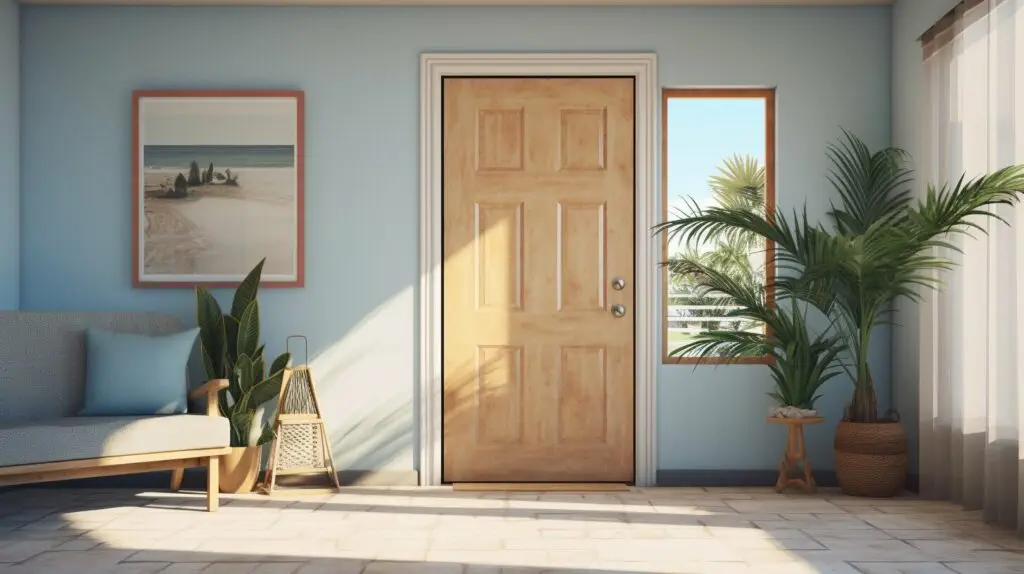Going on vacation is an exciting time, but it’s essential to ensure that your home is safe and secure while you’re away. One question that often arises is whether you should turn off the water supply when you go on vacation.
Turning off the water supply can prevent any leaks or water damage from occurring while you’re away. However, it’s crucial to consider the potential drawbacks of turning off the water supply, such as a loss of water pressure or the need to drain your pipes.

Key Takeaways
- Turning off the water supply can prevent leaks and water damage during vacations.
- Consider the potential drawbacks of turning off the water supply, such as a loss of water pressure.
- Implement water conservation tips to save water and reduce the risk of leaks or water damage.
- Ensure that your plumbing system is in good condition before you leave by checking for leaks and scheduling inspections.
- Inform trusted neighbors or house sitters about your water shut-off plans or provide them with instructions on water usage.
Water Conservation Tips for Vacations
Going on vacation is a time to relax and enjoy a break from our daily routine. However, it’s essential to be mindful of your water usage to conserve water and prevent any plumbing issues from arising while you’re away. Here are some water conservation tips to keep in mind:
- Turn off the main water supply: Turning off the main water supply is one of the most effective ways to conserve water while on vacation. This will not only prevent any leaks or water damage but can also save you money on your water bill. Remember to turn off the valve located near the water meter, and drain the remaining water from the pipes.
- Check for leaks: Before leaving for vacation, it’s essential to check for any potential leaks in your plumbing system. Fixing any leaks or drips ahead of time can save gallons of water in the long run. Pay attention to any running toilets, dripping faucets, or pooling water in your home.
- Use water-efficient appliances: Switching to water-efficient appliances can also help conserve water while on vacation. For example, consider using a low-flow toilet, showerhead, or faucet aerator. These appliances can reduce water usage without sacrificing water pressure or comfort.
- Ask neighbors for help: If you have trusted neighbors, consider asking them to check on your home periodically and ensure that no leaks have occurred. They can also water any plants or gardens that require attention while you are away.
- Turn off all appliances: Turn off all appliances that use water, such as washing machines, dishwashers, and ice makers. This will prevent any potential leaks or overflows while you’re away.
- Collect and reuse water: If you are planning to water your plants or garden before leaving, collect the excess water and use it to water other plants or clean your car. Don’t let the excess water go to waste.
Implementing these water conservation tips can help mitigate potential risks related to your plumbing system and save you money on your water bills. Remember to turn off the main water supply and check for leaks before leaving for your vacation. Being proactive and mindful of your water usage will ensure your home plumbing system is protected while you’re away.
Protecting Home Plumbing During Vacation
Going on vacation is a time to relax and unwind, but it’s important to remember to safeguard your home’s plumbing system while you are away. Here are a few strategies to minimize the risk of leaks, burst pipes, and other plumbing issues that can occur during vacations.

Shut Off the Main Water Supply
One of the most effective ways to protect your home’s plumbing while you’re on vacation is to shut off the main water supply. This will prevent any water from flowing through your pipes, reducing the risk of leaks or burst pipes. The main water shutoff valve is usually located near the water meter or where the main water line enters your home. If you’re unsure, consult with a plumber.
Before shutting off the water supply, it’s essential to turn off all appliances and faucets that use water, including the washing machine, dishwasher, and outdoor sprinklers. This will prevent any remaining water from causing damage while you’re away.
Drain Your Pipes
Draining your pipes is another way to minimize the risk of water damage while you are away. Turn on all the faucets in your home, including the outdoor spigots, to drain any remaining water from the pipes. Once the water stops flowing, turn off the faucets.
If your home has a basement or crawl space, look for a drain valve near the main water shutoff valve. Open the drain valve to remove any remaining water from your pipes.
Set Your Water Heater to Vacation Mode
If you have a water heater, set it to vacation mode or turn it off completely before leaving. This will prevent the water heater from heating any water unnecessarily while you’re away, reducing energy costs and the risk of a malfunction.
Arrange for Someone to Check Your Home
Even if you shut off the water supply and drain your pipes, it’s a good idea to arrange for someone to check your home periodically while you’re away. This person can check for any leaks, water damage, or other issues that may arise during your absence.
If you have trusted neighbors or house sitters, inform them of the water shutoff plans or provide them with instructions on water usage. You can also hire a professional plumbing service to inspect your home and address any potential issues before they become major problems.
By taking these steps, you can protect your home’s plumbing system while you’re on vacation and enjoy peace of mind knowing that your property is safe from water damage.
Shutting Off Water for Extended Trips
If you are planning an extended vacation, shutting off your water supply completely may be the best option to safeguard your home’s plumbing system. Here are some considerations to keep in mind:
- Water safety during vacation: Turning off your water supply is an effective way to prevent any water-related damage that may occur while you’re away. This includes leaks, burst pipes, and flooding.
- Proper precautions: Shutting off your water supply requires proper precautions to be taken to avoid any damage to your plumbing system. This includes draining all water from your pipes and turning off the main water valve.
- Duration of vacation: Consider the duration of your vacation when deciding to shut off your water supply. If you will be gone for an extended period, shutting off water is the better option. However, if you’re only going to be away for a short time, it may not be necessary to take this step.
- Plumbing system condition: It’s important to consider the condition of your plumbing system before turning off the main water valve. If your pipes are old or corroded, turning off the water supply can cause more harm than good. In such cases, it’s best to consult a plumber to come up with a solution.
- Reactivating water: Upon your return, it’s crucial to reactivate your water supply carefully. Turn on the main water valve slowly and check for any leaks. If you notice any issues, turn off the water supply immediately and call a plumber.
Shutting off your water supply can save you from potential plumbing-related disasters while you’re away. However, it’s important to consider the age and condition of your plumbing system before taking this step. If you’re unsure, consult a professional plumber to assess your situation.
Best Practices for Water Usage on Vacations
When going on vacation, it’s essential to conserve water and protect your home’s plumbing system to prevent any potential water damage. Here are some best practices to follow for water usage while you are away:
- Turn off the main water supply: Turning off the main water supply is an effective way to conserve water and prevent any leaks or bursts in the pipes. However, if you choose to do so, make sure to follow the proper steps to shut off the water and reactivate it when you return.
- Check for leaks: Before leaving, inspect your faucets, toilets, and pipes for any leaks. Even a small leak can cause significant damage over time, so it’s crucial to address any issues before you leave.
- Use water-saving devices: Consider installing low-flow showerheads and toilets or using water-saving bags in your toilet tank to reduce water usage.
- Don’t leave water running: Avoid leaving taps or hoses running, even for a short period. Make sure to turn off all appliances that use water, such as dishwashers and washing machines.
- Inform neighbors or house sitters: If you have someone staying in your home while you’re away, instruct them on water usage and make sure they know how to turn off the main water supply in case of an emergency.
By following these best practices, you can conserve water and protect your home’s plumbing system while you enjoy your vacation.
Checking for Leaks Before Leaving
Before you head out for your vacation, it’s essential to check for any potential leaks in your home’s plumbing system. Even small leaks can lead to significant water damage if left unchecked. Here’s a checklist of items to inspect before leaving:
| Item | Action Needed |
|---|---|
| Fixtures | Ensure faucets are not dripping and toilets are not running |
| Pipes | Check for any signs of corrosion, cracks, or leaks. Tighten any loose connections |
| Appliances | Inspect your dishwasher, washing machine, and ice maker for any leaks or issues |
| Valves | Make sure all valves (such as shut-off valves) are closed tightly and not leaking |
If you notice any problems during your inspection, it’s crucial to address them before leaving. If you’re unsure how to fix an issue, consider hiring a professional plumber to take care of it for you. Remember, identifying and fixing leaks ahead of time can save you from costly water damage and repairs.Tip: If you’re short on time, turn off the main water supply before leaving to prevent any potential leaks from causing significant damage.
Arranging for Regular Inspections
Regular inspections of your home’s plumbing system can help prevent water damage during vacations. It is advisable to schedule an inspection with a qualified professional before you leave. This will enable them to identify and address any underlying issues that may lead to water damage.
During the inspection, the plumber will check for any leaky faucets, pipes, and appliances. They will ensure that the water pressure is optimal and the drainage systems are functioning correctly. The plumber will also examine your water heater and make sure that it’s working efficiently.
By arranging for regular inspections, you can take proactive steps to protect your home’s plumbing system and avoid any water damage disasters while you are away.
Tip: Make sure to schedule an inspection with a reputable plumber who is licensed and insured. You can ask for referrals from friends and family or search for a local professional online.
Installing Leak Detection Systems
One of the best ways to safeguard your home plumbing during vacation is by installing a leak detection system. These systems are designed to detect even the smallest leaks in your plumbing system and alert you immediately, allowing you to take swift action and prevent water damage.
There are several types of leak detection systems available, including point-of-use sensors, whole-house sensors, and water shutoff systems. Point-of-use sensors are installed under sinks, near appliances, or in other locations where leaks are likely to occur. Whole-house sensors are installed at the main water supply line and can detect leaks anywhere in your plumbing system. Water shutoff systems are designed to automatically turn off the water supply when a leak is detected.
When choosing a leak detection system, consider the size of your home, the complexity of your plumbing system, and your budget. It’s also essential to ensure that the system you choose is compatible with your plumbing and can be easily installed and maintained.
Installing a leak detection system is an investment in the safety and security of your home’s plumbing system. By detecting leaks early and preventing water damage, you can save yourself from costly repairs and potential health hazards. Consider installing a leak detection system before your next vacation to have peace of mind that your home is protected.

Notifying Neighbors or House Sitters
When going on vacation, it is always a good idea to notify your trusted neighbors or house sitters of your water shut-off plans or instructions on best practices for water usage. This will help ensure the safety of your home’s plumbing system, preventing any potential water damage or leaks from occurring.
If you have decided to turn off the water supply while you are away, make sure to inform your neighbors or house sitters about the shut-off valve and its location. In case of an emergency, they should know how to turn the water back on or who to contact for help.
Additionally, providing instructions on best practices for water usage can help you conserve water and reduce the risk of any unexpected leaks. You can ask your neighbors or house sitters to limit their water usage, avoid flushing non-degradable items down the toilet, and not to pour any cooking oil or grease down the drains.
By notifying your neighbors or house sitters of your water safety plans and providing them with guidelines for water usage, you can ensure that your home’s plumbing system remains in good condition while you are away.
Shutting Off Water for Extended Trips
If you are planning an extended vacation or will be away from your home for an extended period, shutting off the water supply may be the best option to safeguard your home’s plumbing system. By shutting off the water, you can prevent leaks, burst pipes, and other plumbing issues that can occur while you are away.
However, before you shut off the water, it’s essential to consider a few things. First, make sure you know where the main water shut-off valve is located in your home. It’s typically located near the water meter or where the main water line enters your home.
Once you’ve located the valve, turn it off by turning the handle clockwise until it’s tight. This will ensure that the water supply to your home is completely shut off. It’s also a good idea to drain any remaining water from your pipes by turning on your faucets and flushing your toilets.
When you return home, it’s crucial to turn on the main valve slowly and allow any air in the pipes to escape before turning on any appliances or fixtures. This will prevent any water hammer or damage to your plumbing system.
Overall, shutting off the water supply for extended periods is an effective way to safeguard your home’s plumbing system during your vacation. Just remember to turn on the water slowly and allow any air to escape when you return.
Conclusion
Now that you have a better understanding of the best practices for water usage during your vacation, you can make an informed decision about whether to turn off your water supply or not. It’s important to remember that safeguarding your home’s plumbing system while you are away is crucial to avoiding costly water damage.
Protect Your Home
Before leaving on vacation, take the time to inspect your plumbing system for leaks and address any issues that arise. Consider scheduling regular inspections and installing leak detection systems for added protection.
Communicate with Trusted Neighbors or House Sitters
If you have trusted neighbors or house sitters, make sure to provide them with instructions on water usage or your plans to turn off the water supply. This can help ensure the safety of your home’s plumbing system.
Reactivate Water Upon Return
When you return from vacation, follow the proper steps to reactivate your water supply and ensure that everything is functioning correctly. Taking precautions during this process can help avoid any potential damage to your plumbing system.
By following these tips, you can enjoy your vacation without worrying about water damage or plumbing issues. Remember, taking the necessary steps to protect your home’s plumbing system is crucial to avoiding costly repairs and maintaining the integrity of your home.
FAQ
Q: Should I turn off water when on vacation?
A: It is generally recommended to turn off the water supply when you go on vacation to prevent any potential leaks or water damage.
Q: What are some water conservation tips for vacations?
A: To conserve water while on vacation, you can turn off outdoor faucets, adjust the water heater temperature, and refrain from using appliances that require water.
Q: How can I protect my home plumbing during vacation?
A: You can protect your home plumbing by insulating pipes, shutting off the water supply, and conducting regular inspections before leaving.
Q: Should I shut off the water for extended trips?
A: Shutting off the water supply completely for longer vacation periods is a good idea to prevent any potential water-related accidents or damage.
Q: What are the best practices for water usage on vacations?
A: Best practices for water usage on vacations include taking shorter showers, using water-saving fixtures, and avoiding unnecessary water consumption.
Q: How can I check for leaks before leaving?
A: Before leaving, you should inspect your home for any visible leaks, check water meter readings, and ensure all faucets and toilets are properly turned off.
Q: Should I arrange for regular inspections of my plumbing system?
A: Regular inspections of your plumbing system can help identify and address any underlying issues that may lead to water damage. It’s recommended to schedule inspections with a qualified professional.
Q: What are the benefits of installing leak detection systems?
A: Installing leak detection systems can provide an added layer of protection for your home plumbing by alerting you to potential leaks or burst pipes, allowing for timely intervention.
Q: Should I notify neighbors or house sitters about water shut-off plans?
A: If you have trusted neighbors or house sitters, it’s a good idea to inform them about your water shut-off plans or provide them with instructions on water usage to ensure the safety of your home’s plumbing system.
Q: What precautions should I take when reactivating the water upon return?
A: When reactivating the water supply upon return, you should gradually open the main valve and check for any leaks. Inspect faucets, toilets, and appliances for proper functionality.









